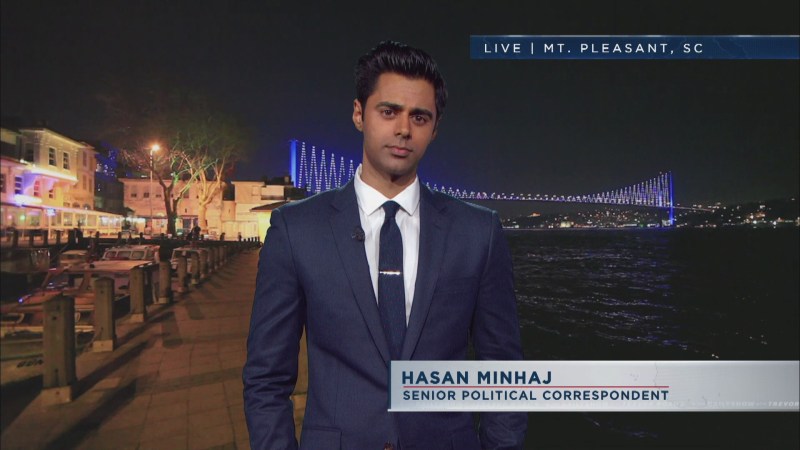At the head of Comedy Centrals’ “The Daily Show” is Trevor Noah, but unless you’re a hardcore viewer, you may not know all that much about the rest of the team — the correspondents, who often take on names like Senior Caucasian Correspondent and Senior Antiquities Correspondent. Juxtaposing the host’s deadpan presentation of the show’s satirical take on news, the correspondents provide some of the most outrageous, snappy-witted comedy on television today.
The Daily recently participated in a call with correspondents Hasan Minhaj and Roy Wood, Jr., to discuss their role on “The Daily Show with Trevor Noah,” the show itself, and the current and undeniably crazy political climate.
The Stanford Daily (TSD): In an election as divisive as this, how essential do you think is the role of political comedy shows?
Hasan Minhaj (HM): I think the rising popularity of political satire, especially if you look at the marketplace right now, the way people consume it with “The Daily Show,” I think its success is due to the fact that we’re basically comedic synthesizers. Not to nerd out, but you know how when your body’s enzymes help you catalyze and digest things? That’s basically what we do. We take really, really complicated, esoteric information, and in seven-and-a-half minute acts we’re able to break it down, pepper in really funny stuff, and I think that’s why people like it. To get the college analogy, we’re like funny history professors, essentially. Does anyone have time to sit through everything on WikiLeaks? You can tune in to “The Daily Show” and we will sit through all of it and be like, “Here are the main things that are important,” with some jokes along the way.
TSD: So how are you using comedy to make this election a little less heavy than it might be?
HM: Well, we have a comedian running, so it’s not that hard.
Roy Wood, Jr. (RWJ): I think comedy is enforced to help people keep their sanity in the midst of all of this because otherwise, you look up, and it’s literally a madhouse. You get to laugh with people.
HM: Yeah. You know what’s crazy? When we were up at the DNC, I saw E! News and VH1 there. What’s wild is that political culture has become popular culture, and that wasn’t always the case. It was never a thing that E! News would be covering, and now because the GOP ran itself like a high school election, where one of the quote-unquote popular kids could run or basically someone who’s infamous ran for president, now it’s one of those things where it’s a free-for-all and our job as comedians is becoming more important.
TSD: A lot of the material that we’re seeing today is actually pretty scary, or depressing, or serious. What is your opinion about comedy — do you see it more as something that makes things lighter or makes people forget or to actually draw attention to these issues and make it more serious?
RWJ: I think comedy is a safe entry point into serious discussion. By keeping it lighter, you make the conversation more palpable and more productive, in my opinion. Everybody doesn’t want to be barked at. If you laid out all the topics “The Daily Show” does in a week and you compare it against any legit, straight-up news magazine show like 60 Minutes or 20/20 or anything that’s on any of the cable networks, I would imagine there’s a great deal of overlap but the way in which we try and approach those discussions are more open to have as a conversation. At least what I try to do is not make it as preachy as much as it does just substantive.
TSD: How does being a minority in the arts and entertainment industry shape your work and how you approach your work, especially with the current push for representation and diversity in media?
RWJ: I feel like I have a responsibility to make sure that I’m doing my job well. I don’t know who I’m being judged by, or who’s using me as a barometer for my race as the whole. That’s one of the issues of being a black person in a white space sometimes — you don’t know how much of what you’re doing is influencing other people’s stereotypes about your race. I also feel like I have a wonderful opportunity on this platform to not solely do this, but when the opportunities present themselves, tell stories that I feel like should be told about my race or things that are important to me, and the things that I might go through because I know I’m not alone. I’m glad I have the opportunity to tell that story because I can’t guarantee that that story would have been told otherwise.
TSD: Because correspondents have essentially a very specific role on the show, kind of like their own comedy beats, is this pre-determined when you get hired? Do you have to craft and cultivate it as you go, or does this vary correspondent-to-correspondent?
RWJ: At least for me and my experience — Hasan can speak to the Jon Stewart regime — but for me, it was kind of just crafting it as you go along. You talk with the writers and your field producers and the field department, and you start getting a feel for the stories that are important to you and what your comedic style is, and the two things just start going together.
HM: Yeah, I would agree with what Roy is saying. Every day, we’re building a new show, and so it happens actually pretty organically. You continue to pitch, you continue to shape the story that you’re really passionate about.
“The Daily Show with Trevor Noah” will be airing a special one-hour live episode on Tuesday, November 8 — Election Night — on Comedy Central at 8 p.m. PST.
Contact Olivia Popp at opopp ‘at’ stanford.edu.
